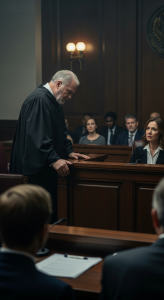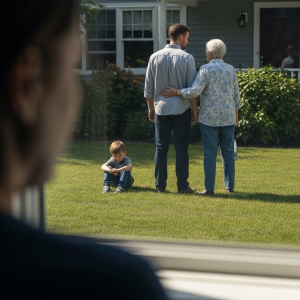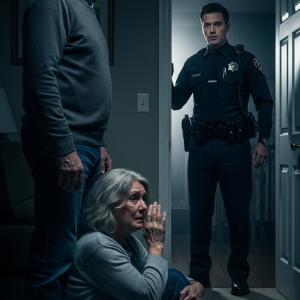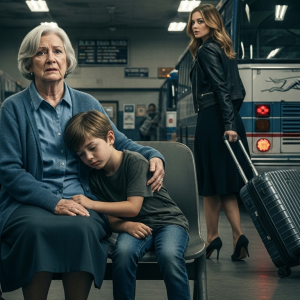The probate court of Westchester County was a theater of quiet grief and loud avarice. Eleanor Vance felt like a solitary actor on a hostile stage, the collective gaze of her step-family pressing down on her like a physical weight. They sat beside their lawyer, a portrait of familial unity forged in greed, their whispers like the rustling of dry leaves.
On the elevated bench sat Judge Arthur Hayes, a man whose face seemed carved from impassive stone. His reputation for fairness was legendary, but so was his intolerance for emotional displays. To him, the law was a machine, and he was its dispassionate operator. Yet, for days, his gaze had lingered on Eleanor a moment too long.
He had interjected during the preliminary questioning, his queries straying from the legal heart of the matter. “Ms. Vance,” he had asked, his voice a low baritone that commanded silence, “tell the court about your relationship with your adoptive father. Not the legalities. Describe the personal bond.” The question felt out of place, a spark of humanity in the cold mechanics of the law.

Eleanor, unaware of the significance, clutched the small silver locket at her throat. It was a nervous habit, a way of drawing strength from the only piece of her biological mother she had ever known. She had held it countless times during the trial, its cool metal a small anchor in a sea of hostility, never noticing the Judge’s eyes briefly tracking the movement.
Now, as she sat in the witness box, she felt a strange, unconscious urge to tap her fingers against the polished wood. It was a rhythmic, four-beat pattern that came to her in moments of stress. On his high bench, Judge Hayes stilled his own hand, hiding the identical, lifelong habit beneath his robes. He dismissed the flicker of recognition as a strange coincidence.
The opposing counsel, a sharp-suited lawyer named Mr. Davenport, rose to his feet. He moved with the predatory grace of a circling shark, his smile all teeth. His goal was simple: to paint Eleanor not as a loving daughter, but as a manipulative interloper.
“Ms. Vance,” Davenport began, his voice dripping with condescension, “you entered the life of the esteemed Mr. Gable when you were a teenager, correct? A foster child, taken in out of the kindness of his heart.”
“He was my father,” Eleanor said, her voice quiet but firm. “He adopted me. He was the only father I ever knew.”
“A ‘father’ whose considerable fortune you now stand to inherit, displacing his natural-born children,” Davenport countered, gesturing dramatically toward his clients. “Tell me, Ms. Vance, did you spend your years in his home cultivating a genuine affection, or were you cultivating an investment?”
The accusation hung in the air, venomous and ugly. Eleanor’s own lawyer, a sharp and composed woman named Ms. Chen, rose to object, but Eleanor held up a hand, her eyes locked on Davenport.
“The only thing I ‘cultivated’ was a vegetable garden in the backyard with the man who taught me how to drive, who helped me with my homework, and who held my hand when I graduated college. His children visited him on holidays. I was there every single day.”
Davenport smirked. “A compelling performance. But affection doesn’t have a line item in a will. We contend that you unduly influenced a lonely, aging man, isolating him from his true family and preying on his generosity.” He paced before the jury box. “A classic case of a cuckoo in the nest.”
Ms. Chen stood. “Your Honor, the plaintiff’s counsel has spent this entire trial assassinating my client’s character. I would like to present an item that speaks not to finance, but to the core of who Ms. Vance is—an item of deep personal significance.”
“Objection!” Davenport snapped. “Irrelevant and overly sentimental. We are here to discuss the legal validity of a will, not to look at family trinkets.”
Judge Hayes leaned forward, his expression unreadable. For a moment, he seemed to be considering the objection. Then, he spoke, his voice firm. “Overruled. The nature of the testator’s relationship with the defendant is central to this case. Proceed, Ms. Chen. Let’s see this ‘trinket’.”
Ms. Chen nodded to Eleanor, who carefully unclasped the silver locket from her neck and handed it to the bailiff. “I would ask that an image of this item be projected for the court to see,” Ms. Chen requested.
A moment later, the locket appeared on the large screen behind the witness stand. It was simple, elegant, and clearly old, its silver surface worn smooth with time. The front was unadorned.
“Please display the back of the locket,” Ms. Chen instructed. The image changed. On the reverse side was a small, stylized engraving. It was a lighthouse, its beam cutting through a swirling pattern of waves.
A sharp, audible intake of breath echoed through the silent courtroom. It came from the bench.
Judge Arthur Hayes froze, his knuckles turning white where he gripped the arms of his chair. The courtroom, the lawyers, the jury—it all faded away into a muffled roar. He was no longer in his courtroom. He was a young man again, standing on a windswept pier nearly forty years ago.
It was not just a locket. It was a promise. It was a betrayal. It was the ghost of a girl named Clara, her eyes full of a future he was about to steal from her. He could feel the cold metal in his own hand as he fastened it around her neck. “So you’ll always have a light to guide you home,” he had whispered, knowing full well he was about to extinguish that light forever.
He looked from the image on the screen to the face of the woman in the witness box. For the first time, he didn’t just see a litigant. He saw Clara’s eyes. He saw the same determined set of her jaw. The crushing weight of a secret he had buried for a lifetime came crashing down on him, right there, in the seat of his own power.
Judge Hayes felt the blood drain from his face. His carefully constructed world was shattering, piece by agonizing piece. He struggled to breathe, to regain the iron composure that had defined his entire career. His hands trembled beneath the shelter of his desk.
“Ms. Chen,” he managed to say, his voice a hoarse whisper that was nothing like his usual commanding tone. “What is the relevance of this… engraving?”
“Its relevance, Your Honor,” Ms. Chen said, her eyes fixed on the Judge, “is established by our final piece of evidence.” She held up a sealed, yellowed envelope. “This is a letter, written by the late Mr. Gable, with instructions that it only be opened in the event his last will and testament was formally contested.”
Davenport was on his feet again. “Objection! Hearsay! We have no way of verifying the contents or context of this… theatrical device!”
“The objection is noted,” Judge Hayes said, his voice strained. He felt trapped, a prisoner on his own bench. He knew he should stop this, but some morbid, self-destructive force compelled him to see it through. “And it is overruled. You may read the letter, Ms. Chen.”
Ms. Chen broke the wax seal. The entire courtroom held its breath as she began to read the steady, clear handwriting of the man whose legacy they were fighting over.
“To whomever reads this,” the letter began. “If these words are being spoken in a court of law, it means my own children have chosen greed over my final wishes. It means they have attacked the character of the finest person I have ever known, my daughter, Eleanor.”
The step-siblings, Richard and Caroline, flushed with anger.
“I loved Eleanor as my own from the moment I met her, but she was never truly mine to claim. She was the daughter of a young woman who was forced to give her up. A woman who died with a broken heart, abandoned by a man who chose his career over his child.”
Every eye in the room slowly, inevitably, turned toward the bench. Judge Hayes sat ramrod straight, his face a ghastly shade of white. He looked like a man who had just seen his own ghost.
Ms. Chen’s voice did not waver as she read the final, devastating lines. “Her mother left her only one thing: a small, silver locket. It was a gift from Eleanor’s biological father. He had a lighthouse engraved on the back, a symbol of a promise he never intended to keep. I hired a private investigator years ago. I know who this man is. I know of his power and his position. This letter is not to name him—it is to shame him. May God have mercy on his soul, for he has shown none to his own flesh and blood.”
The letter did not need a name. The locket had already spoken it. The plea for justice from a dead man had just become a brutal, public indictment of the judge presiding over his case.
The silence in the courtroom was absolute, a thick, suffocating blanket of shock. The clicking of the court reporter’s keyboard was the only sound, each tap an punctuation mark in the demolition of a man’s life.
Judge Arthur Hayes did not move for a long, agonizing moment. He stared out over the courtroom, but he saw nothing. He saw only the wreckage of his choices, the fortress of lies he had built over forty years reduced to rubble by a locket and a letter.
He cleared his throat, a dry, rasping sound. When he spoke, his voice was hollow, stripped of all its former authority. “This court,” he began, his words slow and heavy, “is in recess.”
He fumbled with his gavel, his hand shaking so violently he could barely grasp it. He didn’t bring it down with his customary sharp crack. It landed with a soft, defeated thud.
“Effective immediately,” he continued, his gaze fixed on a point far beyond the back wall of the room, “I am recusing myself from this case. The reason is a severe and irreconcilable personal conflict of interest.” He pushed his chair back, the screech of its legs echoing the screech in his own soul.
Without another word, he stood and walked, almost stumbling, toward the door to his chambers. He didn’t look at Eleanor. He couldn’t. The weight of her gaze, the gaze of the daughter he had abandoned, was more than he could bear. The door clicked shut behind him, leaving a stunned and chaotic courtroom in his wake.
His career was over. The scandal would be immediate and catastrophic. A sitting judge, unmasked in his own courtroom, discovered to be the long-lost father of a litigant he was judging. It was a legal and ethical implosion of unprecedented scale.
The case of Gable v. Gable would be reassigned, but the outcome was already decided. The letter, combined with the judge’s spectacular self-recusal, had destroyed the step-siblings’ case. Their greed and cruelty had been laid bare for all to see.
Eleanor won. Weeks later, a different judge summarily upheld her adoptive father’s will, ending the legal battle. She inherited the house she grew up in, the financial security her father had wanted for her, and the validation of his love. But her victory was hollowed out by a devastating truth.
The man on the bench, the symbol of impartial justice, was the source of her life’s deepest wound. Her father wasn’t a faceless mystery; he was a man who had known of her existence and chosen to forsake it for status and power. The destruction was not hers, but his, yet she was caught in the emotional shrapnel.
For Judge Hayes, the destruction was total. The legal community shunned him. The press was relentless. The prestigious life he had so carefully constructed—the life for which he had sacrificed his daughter—was annihilated. He was a pariah, a cautionary tale whispered in the halls of justice.
The psychological punishment was the most severe. Every night, he saw Clara’s face. Every day, he was haunted by the image of Eleanor in the witness box, strong and dignified, a living testament to his failure as a man. He had lost the career he had chosen over her, the ultimate, bitter irony. Justice, it turned out, had a long memory.
Weeks after the verdict, the autumn air was crisp outside the Westchester County Courthouse. The media frenzy had died down, leaving only the quiet hum of daily life. Eleanor walked down the stone steps, a box of personal effects from her late father’s lawyer’s office in her hands.
Across the street, leaning against a stone wall, stood a man who looked like a ghost. He was no longer the imposing Judge Hayes in black robes. He was just Arthur, a stooped, aging man in a simple overcoat, his face etched with a grief that seemed to have aged him a decade.
He wasn’t waiting for a car. He wasn’t meeting anyone. He was just waiting. Watching. He saw her and took a hesitant step forward, then stopped, as if held back by an invisible wall of his own making.
Eleanor paused on the sidewalk, her heart pounding. She looked at the man who was her father. There was no anger left, only a vast, aching sadness. She had won her inheritance, but she was now facing a new, more complex chapter—the truth of her own story.
He didn’t speak. He just stood there, his eyes filled with a lifetime of apology he could never voice. He was a man waiting for a verdict that no court could issue, hoping for a single word of grace from the daughter he had sentenced to a life without him. Eleanor met his gaze for a long moment, then turned and walked away, the final judgment still unsaid.




